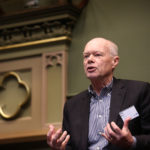Personal Innovation: Design yourself for innovation
So much has been written about innovation and fostering an innovative culture in organisations, but we rarely address personal innovation as a key component of organisational improvement. Abby Robinson says it’s worth rising to the greatest challenge of all, innovating ourselves to become the best we can be today.
Innovation is about creating new ideas that add value and can be implemented. We often discuss innovation on a corporate or organisational level but not on an individual level.
Personal innovation is about the individual rethinking the way they balance the personal and the professional/corporate business world. In cultivating a culture of innovation it is important that we encourage individuals to develop themselves in new ways so they can go on to be innovative in their work practices.
Why is personal innovation so important?
Thomas Friedman’s best seller ‘The World is Flat’ highlights that the world is connected in a way that makes it possible to do business, or almost anything else, instantaneously with millions of other people across the planet.
Whereas in the past globalisation has been driven by major corporations and large organisations like the World Bank, it is currently being driven by the individual like the desktop freelancers and innovative start ups all over the world.
What is significant is that individuals now compete globally, and if they do not innovate may suffer the same fate as those companies who don’t innovate – they will be left behind by the competition.
Personal innovation is about designing yourself to better compete on an individual level. I have been involved in innovation programs across many sectors internationally for over 25 years. I consistently see individuals with passion and enthusiasm, even if this is sprinkled with some skepticism.
So much has been written about innovation, leadership, capabilities, and fostering an innovative culture in organisations, yet we rarely address personal innovation as a key component of organisational improvement. The reality is that most ideas people create are improvements to the world around them especially if they are able to be implemented.
Over the years I have watched as the forces of traditionalism and conformity leave some individuals underwhelmed. Rather than feeling empowered and engaged, they describe feeling as if being under the ‘dark cloud of mediocrity’. Some are tempted to resign or play it safe by diluting their innovative potential, making compromises they may regret later.
Most of us have been there at some stage of our careers. It can be easy to disengage and feel disempowered. We lose track of our vision of what can be new or possible.
Sadly, few organisations reach the ‘gold standard’, where people’s values align with the organisation’s vision, values, and practices.
This leads me to the obvious need for more research to explore the benefits of the design and delivery of ‘breakthrough personal innovations’. What questions should we ask to help us to make a vital difference in how we design our own lives?
How can we create lives to better manage and drive professional challenges and expectations in an organisational world where paradox and uncertainty are increasing and trust is decreasing? What conversations do we need to have to get the most out of life?
Innovation is not just something organisations should aim for; all of us should strive to be innovative in whatever it is we do. How do we design ourselves for innovation rather than just looking to others to lead the way?
When we embrace personal innovation, we become empowered and take responsibility for our passion, drive, and vision. We create ripples that nurture the whole innovation ecosystem, fostering more self-awareness and lifting the potential to cultivate confident leaders in all organisations.
If we are to genuinely compete globally on an individual level, we need to rise to the greatest challenge of all, innovating ourselves to become the best we can be today. We can then harness this capacity every day in our personal and professional lives.
Dr Abby Robinson has a strong international science and research background leading many innovation initiatives across research, private and government. Abby is an expert in educating and raising awareness about the many facets of innovation and driving genuine changes that can be achieved on all levels through developing and investing in collaborations, networks and partnerships. Connect with Abby on: Linkedin Abby Robinson














